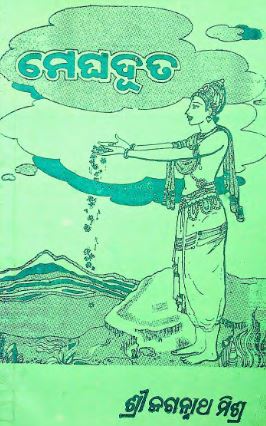In the enchanting world of classical Indian literature, few works shine as resplendently as Kalidasa’s “Meghaduta” (The Cloud Messenger). Originally penned in the 4th or 5th century CE, this exquisite Sanskrit poem has captivated hearts for centuries with its lyrical beauty and emotional depth. In 1998, Odia literature witnessed an exceptional moment when Jagannath Misra, a revered scholar and poet, brought forth his masterful translation of “Meghaduta,” making this timeless classic accessible to Odia readers.
Kalidasa’s “Meghaduta” is a unique blend of romanticism, longing, and natural splendor. The narrative unfolds as a Yaksha, a celestial being, exiled by his master Kubera for dereliction of duty, sends a message to his beloved through a monsoon cloud. This cloud, serving as a divine messenger, journeys across the Indian subcontinent, narrating the breathtaking landscapes it encounters. The Yaksha’s profound love and yearning for reunion with his beloved becomes a poignant thread that weaves the poem together.
Jagannath Misra’s translation is a literary marvel. He brings to life the essence of Kalidasa’s brilliantly intricate imagery while maintaining the rhythmic flow of the original. Translating a classic work is no small feat; it demands a deep understanding of both the source and target languages, as well as an ability to capture the soul of the original composition. Misra rises to this challenge with elegance and finesse.
In his Odia rendition, Misra preserves the lyrical quality and evocative beauty of Kalidasa’s verses. The lush descriptions of nature, laden with metaphors, come alive vividly, allowing Odia readers to traverse the same magical landscapes that the Yaksha’s cloud does. From the mighty peaks of the Himalayas to the sacred city of Alaka, each scene is painted with careful attention to detail, immersing readers in the rich tapestry of ancient Indian culture and geography.
Misra’s work is also notable for its scholarly precision. He meticulously retains the nuances of the original Sanskrit text, ensuring that the profound emotions and philosophical undertones are not lost in translation. His choice of words and phrases mirrors the elocution of classical Odia poetics, making the text resonate with a timeless quality that echoes the grandeur of Kalidasa’s vision.
The publication of this translation in 1998 marked a significant contribution to Odia literature. It opens a window to the grandeur of Sanskrit poetry, inviting readers to engage with the sublime traditions of Indian classical literature. Misra’s translation is not merely a linguistic conversion; it is an interpretative act that honors the spirit of “Meghaduta,” allowing it to breathe anew in a different cultural context.
In essence, Jagannath Misra’s Odia translation of “Meghaduta” is a treasure trove for both poetry enthusiasts and scholars. It bridges the temporal and linguistic gaps between ancient and modern, Sanskrit and Odia, enthralling readers with the timeless saga of love and longing encapsulated within celestial verses. This work stands as a testament to the enduring legacy of Kalidasa’s genius and Misra’s adept craftsmanship, ensuring that “Meghaduta” continues to inspire and enchant across generations and geographies.
Books Info
| Books name | Meghaduta |
| Editor | Kalidas; Jagannath Misra |
| No Of pages | 48 |
| Publisher | Anarapurnna Publishers |
| Publication | 1998 |
| Printed At | Anarapurnna Printers |
| Distributor | NA |

